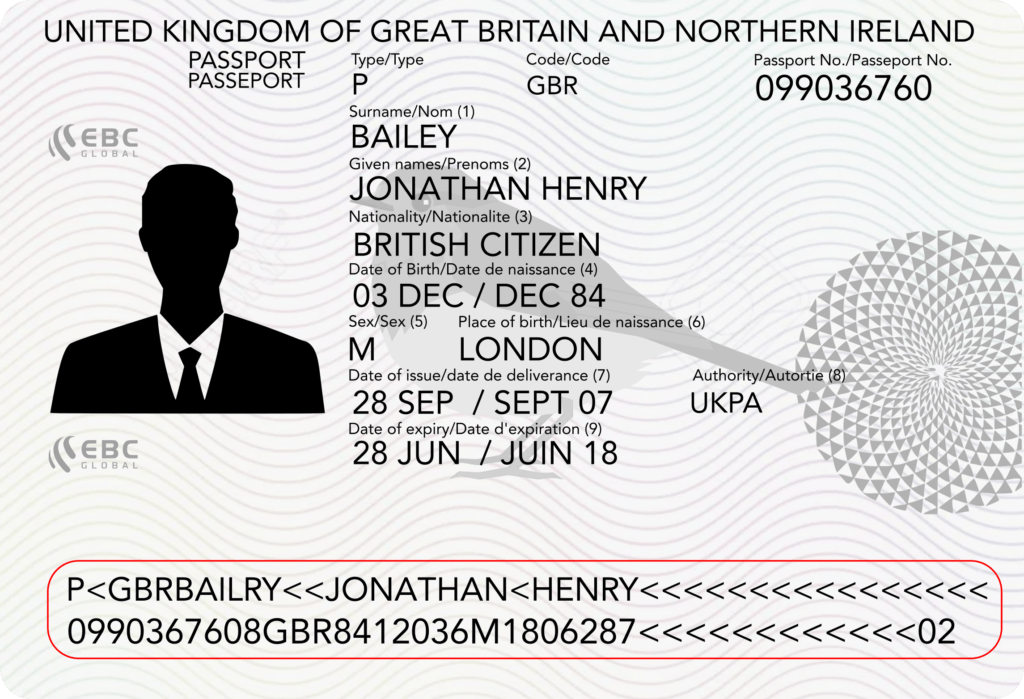Following the Home Office policy paper published on 27 December 2021, employers will be able to use an Identification Document Validation Technology (IDVT) service provider to carry out digital identity checks on their behalf on British and Irish passport holders and Irish passport card holders.
But how exactly does IDVT work in regards to a digital right to work checks?
In this article, we look to answer this question:
IDVT starts with data extraction
An IDVT (identity document verification technology) extracts data from the ID document for further processing. Typically, the data extracted is:
- Full name (including any middles names)
- Date of birth
- Nationality/place of birth
- Issuing country or body
- Expiry date of the document
- MRZ code (passports)
- Document number
- Photo
IDVT digital right to work check process
Following data extraction, the IDVT will run several checks to ascertain if the document is valid and genuine.
MRZ Code
A lot of an IDVT’s processes involve reading the MRZ code of an ID document.
MRZ or Machine Readable Zone is a part of an ID document (specifically passports) which contains the document holder’s personal data. An MRP (machine readable passport), the most common form of passport in the world, contains an MRZ.

A machine (IDVT) will read the MRZ and extract the document holder’s data and forgery detection numbers known as “checksum”. Following this, a calculation of the checksum of the extracted data is performed, which is then compared with the original checksums to allow for data verification.
IDVT will check the following from an MRZ code:
- All MRZ lines have the same length
- Valid MRZ codeline length
- All characters valid
- Overall checksum
- Document number checksum
- Date of birth checksum
- Expiry date checksum
- Personal number checksum
- Name formatted correctly
- Issuing state valid
Document Tamper Detection
IDVT uses advanced scanner technology to do a data integrity analysis, which checks for texture and density of the fonts throughout the document. In addition, an IDVT can detect if the photo has been tampered with.
Amberhill Check
In the event an IDVT recognises a document is fake, there is the option to perform an Amberhill check. Amberhill refers to the Metropolitan Police Service database where reports of fraudulent ID documents are sent.
When the Amberhill database receives the data, it will check if the ID documentation is fraudulent or false. If the database identifies the document as fake, then the Metropolitan Police Service will treat it as a crime in action.
Amberhill data is available to nominated public and private sector organisations, which does include IDVT and DBS (Disclosure and Barring Service) providers. More information on Amberhill checks can be found here.
Can other documents be used for digital right to work checks?
At the moment, only British/Irish passports and Irish passport cards or a share code (for non-British nationals) can be used to run a digital right to work check.
If the individual does not have an IDVT-qualifying document (e.g. they posses a Birth certificate), then the right to work check will need to be performed manually.
The benefits of IDVT for digital right to work checks
Compared to manual checks, digital right to work checks can easily detect fraudulent documents that even a person with training and experience might miss.
In addition, all IDVT providers will be automating the right to work check process, which will allow you to obtain an electronic report for your records. This eliminates the need to photocopy and store paper copies of the ID documents. In addition, your records can be stored for future reference more easily and securely.
In summary, the benefits of an IDVT for digital right to work checks are:
- Increased compliance
- Prevention of legal ramifications that occur from an illegal hire (including fines of up to £20,000 per illegal workers and imprisonment)
- Encourages a single, consistent process for staff who make ID checks
- A quicker process (most results are given in 1 business hour); saving organisations valuable resources
- Protects organisations from accepting sophisticated, fraudulent documents
If you are looking for IDVT, it may be worth considering our Employment Check Pro software solution. Not only will Pro allow for digital right to work checks, it also allows companies to run DBS (criminal record) checks, automated referencing, and 100s of other functions designed to allow for pre-employment screening compliance. To learn more, visit /pro
